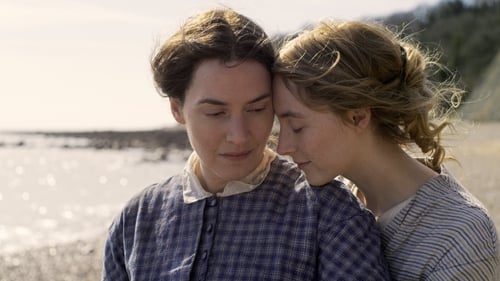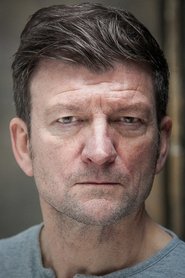Awards season always arrives with a host of films desperate to win the affection of industry insiders, critics and the general public alike. Even in a year as unorthodox and unconventional as 2020, the list of Oscar hopefuls is as oversaturated with pseudo-contenders as ever, and none is more symbolic of this excess fluff than Francis Lee’s Ammonite. Once assumed to be a major awards season player, Ammonite has fallen from its sturdy perch into the cold, forgotten depths of the late-year frenzy and rightfully so.
Set in the cold and dreary seaside of 1840s England, Kate Winslet stars as Mary Anning, once an acclaimed and fossil hunter who has found solace in her own seclusion throughout the twilight of her career. But when a wealthy visitor entrusts Mary to entertain and care for his wife, Charlotte (Saoirse Ronan), she simply cannot afford to reject his offer. What begins as a combative relationship between these two women ignites into a fiery passion that goes against all social norms.

Written and directed by Francis Lee, Ammonite is the follow up to his well-received 2017 debut feature, God’s Own Country, which examined the budding homosexual relationship between an English sheep farmer and a Romanian migrant worker. Needless to say, the themes explored in this film are not uncharted waters for Lee. Yet, his latest effort is neither bold or daring in any way whatsoever, failing to mirror his intention of a courageous love story between the two main character. Instead, Lee relies on mere aesthetics such as exquisite cinematography and authentic set and costume designs to embolden an otherwise hollow endeavor. Ammonite is silent and subtle to a fault. The audience is forced to wade through quiet imagery and predictable performances that sadly culminate in a devastatingly unconvincing love story. Both Winslet and Ronan, whose career achievements speak volumes about their onscreen abilities, have their deeply committed acting talents squandered by subpar direction and razor-thin characters. Ammonite lacks vigor and energy, serving as a dull and lifeless late-year entry that undoubtedly falls short of its lofty awards season aspirations.
-
 NameKate WinsletCharacterMary Anning
NameKate WinsletCharacterMary Anning -
 NameSaoirse RonanCharacterCharlotte Murchison
NameSaoirse RonanCharacterCharlotte Murchison -
 NameGemma JonesCharacterMolly Anning
NameGemma JonesCharacterMolly Anning -
 NameJames McArdleCharacterRoderick Murchison
NameJames McArdleCharacterRoderick Murchison -
 NameAlec SecăreanuCharacterDr. Lieberson
NameAlec SecăreanuCharacterDr. Lieberson -
 NameFiona ShawCharacterElizabeth Philpot
NameFiona ShawCharacterElizabeth Philpot -
 NameSarah WhiteCharacterMuseum Cleaning Woman
NameSarah WhiteCharacterMuseum Cleaning Woman -
 NameLiam ThomasCharacterMuseum Workman
NameLiam ThomasCharacterMuseum Workman -
 NameSam ParksCharacterCurator
NameSam ParksCharacterCurator -
 NameClaire RushbrookCharacterEleanor Butters
NameClaire RushbrookCharacterEleanor Butters -
 NameNick PearseCharacterThree Cups' Waiter
NameNick PearseCharacterThree Cups' Waiter -
 NameVictoria ElliottCharacterThree Cups' Maid
NameVictoria ElliottCharacterThree Cups' Maid -
 NameBeatrice CurnewCharacterParty Guest
NameBeatrice CurnewCharacterParty Guest -
 NameSusie BaxterCharacterParty Guest
NameSusie BaxterCharacterParty Guest -
 NameGethin AldermanCharacterParty Guest
NameGethin AldermanCharacterParty Guest -
 NameRobert PurdyCharacterParty Guest
NameRobert PurdyCharacterParty Guest -
 NameMax DowlerCharacterParty Guest
NameMax DowlerCharacterParty Guest -
 NamePaul DoddsCharacterParty Guest
NamePaul DoddsCharacterParty Guest -
 NameJohn MackayCharacterFine Gentleman
NameJohn MackayCharacterFine Gentleman -
 NameMladen PetrovCharacterDavid The Postman
NameMladen PetrovCharacterDavid The Postman -
 NameWendy NottinghamCharacterCharlotte's Maid
NameWendy NottinghamCharacterCharlotte's Maid -
 NameDavid JuritzCharacterMusician
NameDavid JuritzCharacterMusician -
 NameBen HancoxCharacterMusician
NameBen HancoxCharacterMusician -
 NameJames BoydCharacterMusician
NameJames BoydCharacterMusician -
 NamePeter GregsonCharacterMusician
NamePeter GregsonCharacterMusician -
 NameMichael HennessyCharacterGarden Party Guest (uncredited)
NameMichael HennessyCharacterGarden Party Guest (uncredited) -
 NameHarvey ScrimshawCharacterCallow Youth (uncredited)
NameHarvey ScrimshawCharacterCallow Youth (uncredited)
-
 NameFrancis LeeJobDirector
NameFrancis LeeJobDirector -
 NameDustin O'HalloranJobOriginal Music Composer
NameDustin O'HalloranJobOriginal Music Composer -
 NameVolker BertelmannJobOriginal Music Composer
NameVolker BertelmannJobOriginal Music Composer -
 NameFrancis LeeJobWriter
NameFrancis LeeJobWriter -
 NameBen WinklerJobOrchestrator
NameBen WinklerJobOrchestrator -
 NameAli GriffithsJobVisual Effects Producer
NameAli GriffithsJobVisual Effects Producer -
 NameIvana PrimoracJobMakeup Designer
NameIvana PrimoracJobMakeup Designer -
 NameMichael O'ConnorJobCostume Design
NameMichael O'ConnorJobCostume Design -
 NameEmile ShermanJobProducer
NameEmile ShermanJobProducer -
 NameIain CanningJobProducer
NameIain CanningJobProducer -
 NameFodhla Cronin O'ReillyJobProducer
NameFodhla Cronin O'ReillyJobProducer -
 NameChris WyattJobEditor
NameChris WyattJobEditor -
 NameStéphane FontaineJobDirector of Photography
NameStéphane FontaineJobDirector of Photography -
 NameJohnnie BurnJobSound Designer
NameJohnnie BurnJobSound Designer -
 NameRobert HowJobCo-Producer
NameRobert HowJobCo-Producer -
 NameFiona WeirJobCasting Director
NameFiona WeirJobCasting Director -
 NameIvana PrimoracJobHair Designer
NameIvana PrimoracJobHair Designer -
 NameSimon GillisJobExecutive Producer
NameSimon GillisJobExecutive Producer -
 NameRose GarnettJobExecutive Producer
NameRose GarnettJobExecutive Producer -
 NameMary BurkeJobExecutive Producer
NameMary BurkeJobExecutive Producer -
 NameSarah FinlayJobProduction Design
NameSarah FinlayJobProduction Design -
 NameZygi KamasaJobExecutive Producer
NameZygi KamasaJobExecutive Producer -
 NameNicky EarnshawJobCo-Producer
NameNicky EarnshawJobCo-Producer -
 NameCharlotte RogersJobKey Hair Stylist
NameCharlotte RogersJobKey Hair Stylist -
 NameSophie HervieuJobSet Decoration
NameSophie HervieuJobSet Decoration -
 NameCharlotte RogersJobKey Makeup Artist
NameCharlotte RogersJobKey Makeup Artist -
 NameDeborah HardingJobPost Production Supervisor
NameDeborah HardingJobPost Production Supervisor -
 NameGemma NunnJobSecond Assistant Director
NameGemma NunnJobSecond Assistant Director -
 NamePolly JefferiesJobProduction Supervisor
NamePolly JefferiesJobProduction Supervisor -
 NameLucy AndrewsJobThird Assistant Director
NameLucy AndrewsJobThird Assistant Director -
 NameGuy BevittJobArt Direction
NameGuy BevittJobArt Direction -
 NameIndia JaquesJobAssistant Art Director
NameIndia JaquesJobAssistant Art Director -
 NameGeorgina MillettJobGraphic Designer
NameGeorgina MillettJobGraphic Designer -
 NamePaddy PaddisonJobStandby Art Director
NamePaddy PaddisonJobStandby Art Director -
 NameDina KarklinaJobConstruction Manager
NameDina KarklinaJobConstruction Manager -
 NameEmma HarrisonJobUnit Manager
NameEmma HarrisonJobUnit Manager -
 NameRebecca ToddJobAssistant Set Decoration
NameRebecca ToddJobAssistant Set Decoration -
 NameJess AlexanderJobGraphic Designer
NameJess AlexanderJobGraphic Designer -
 NameCara WalkerJobPetty Cash Buyer
NameCara WalkerJobPetty Cash Buyer -
 NameEwan RobertsonJobProperty Master
NameEwan RobertsonJobProperty Master -
 NameRichard FieldJobSupervising Art Director
NameRichard FieldJobSupervising Art Director -
 NameSimon HedgesJobFirst Assistant Director
NameSimon HedgesJobFirst Assistant Director -
 NameDean CoffeyJobElectrician
NameDean CoffeyJobElectrician -
 NameColin StrachanJobKey Grip
NameColin StrachanJobKey Grip -
 NameGrace ClarkJobPrincipal Costumer
NameGrace ClarkJobPrincipal Costumer -
 NameMassimo VicoJobSpecial Effects Supervisor
NameMassimo VicoJobSpecial Effects Supervisor -
 NameAnna Seifert-SpeckJobScript Editor
NameAnna Seifert-SpeckJobScript Editor -
 NameJonjo SticklandJobMarine Coordinator
NameJonjo SticklandJobMarine Coordinator -
 NameDougal CadiouJobPost Production Accountant
NameDougal CadiouJobPost Production Accountant -
 NameKristin DavisJobDigital Imaging Technician
NameKristin DavisJobDigital Imaging Technician -
 NameTrisha JoyceJobUnit Medic
NameTrisha JoyceJobUnit Medic -
 NameChristian MuresanJobSpecialized Driver
NameChristian MuresanJobSpecialized Driver -
 NameOscar BurnJobSound Recordist
NameOscar BurnJobSound Recordist -
 NamePhil CapeJobProduction Sound Mixer
NamePhil CapeJobProduction Sound Mixer -
 NameCrispin LayfieldJobStunt Coordinator
NameCrispin LayfieldJobStunt Coordinator -
 NameYara CaubetJobTravel Coordinator
NameYara CaubetJobTravel Coordinator -
 NameNicholas HajicostaJobFirst Assistant Accountant
NameNicholas HajicostaJobFirst Assistant Accountant -
 NameRaz KhamehseifiJobElectrician
NameRaz KhamehseifiJobElectrician -
 NameEddy PearceJobLocation Manager
NameEddy PearceJobLocation Manager -
 NameDarryl KingJobPainter
NameDarryl KingJobPainter -
 NameSarah BrestJobTruck Supervisor
NameSarah BrestJobTruck Supervisor -
 NameRuth GoodmanJobScript Consultant
NameRuth GoodmanJobScript Consultant -
 NameSimon JarrettJobScript Consultant
NameSimon JarrettJobScript Consultant -
 NameDani BiernatJobStunt Coordinator
NameDani BiernatJobStunt Coordinator -
 NameJohannes LohmannJobCamera Trainee
NameJohannes LohmannJobCamera Trainee -
 NameDarren PayneJobSpecialized Driver
NameDarren PayneJobSpecialized Driver -
 NameJonah MayfieldJobAssistant Production Coordinator
NameJonah MayfieldJobAssistant Production Coordinator -
 NameJim HajicostaJobProduction Accountant
NameJim HajicostaJobProduction Accountant -
 NameCatharine BrownJobFirst Assistant "A" Camera
NameCatharine BrownJobFirst Assistant "A" Camera -
 NameHelena BeesonJobFirst Assistant Editor
NameHelena BeesonJobFirst Assistant Editor -
 NameJulie TottmanJobAnimal Coordinator
NameJulie TottmanJobAnimal Coordinator -
 NameSimone CharnleyJobSpecialized Driver
NameSimone CharnleyJobSpecialized Driver -
 NameKatherine BridleJobAssociate Producer
NameKatherine BridleJobAssociate Producer -
 NameTila Sampaio DiogoJobProduction Assistant
NameTila Sampaio DiogoJobProduction Assistant -
 NameAlison StreatfieldJobSecond Assistant "A" Camera
NameAlison StreatfieldJobSecond Assistant "A" Camera -
 NameRichard CorneliusJobSteadicam Operator
NameRichard CorneliusJobSteadicam Operator -
 NameScott ClementsJobFirst Assistant Editor
NameScott ClementsJobFirst Assistant Editor -
 NameDaniel VicoJobSpecial Effects Technician
NameDaniel VicoJobSpecial Effects Technician -
 NameSarah WilsonJobCasting Associate
NameSarah WilsonJobCasting Associate -
 NameMick HurrellJobHealth and Safety
NameMick HurrellJobHealth and Safety -
 NameBill BrownJobArt Direction
NameBill BrownJobArt Direction -
 NameSara KunaJobArt Department Trainee
NameSara KunaJobArt Department Trainee -
 NameAnu PekkarinenJobSet Production Assistant
NameAnu PekkarinenJobSet Production Assistant -
 NameHolly RosenthalJobPrincipal Costumer
NameHolly RosenthalJobPrincipal Costumer -
 NameRosie SinfieldJobMakeup Artist
NameRosie SinfieldJobMakeup Artist -
 NameStephanie AndrewJobAssistant Location Manager
NameStephanie AndrewJobAssistant Location Manager -
 NameLaura HartJobDialect Coach
NameLaura HartJobDialect Coach -
 NameJo VaughanJobAnimal Coordinator
NameJo VaughanJobAnimal Coordinator -
 NameNigel MooreJobSpecialized Driver
NameNigel MooreJobSpecialized Driver -
 NameCalin NicoaraJobSpecialized Driver
NameCalin NicoaraJobSpecialized Driver -
 NameAlan GrahamJobBest Boy Electric
NameAlan GrahamJobBest Boy Electric -
 NameRob DaviesJobSpecialized Driver
NameRob DaviesJobSpecialized Driver -
 NameTihamer LaszloJobCarpenter
NameTihamer LaszloJobCarpenter -
 NameVincent GoodsellJobDigital Compositor
NameVincent GoodsellJobDigital Compositor -
 NameConstanze SannemüllerJobMusician
NameConstanze SannemüllerJobMusician -
 NameDavid HarrimanJobSet Production Assistant
NameDavid HarrimanJobSet Production Assistant -
 NameTamsin SpiveyJobScript Supervisor
NameTamsin SpiveyJobScript Supervisor -
 NameAndy ColeJobGaffer
NameAndy ColeJobGaffer -
 NamePatrick GledhillJobGenerator Operator
NamePatrick GledhillJobGenerator Operator -
 NameLee HoskenJobStandby Carpenter
NameLee HoskenJobStandby Carpenter -
 NameChloe TaylorJobAssistant Set Decoration Buyer
NameChloe TaylorJobAssistant Set Decoration Buyer -
 NameJohn WeeksJobFirst Assistant Editor
NameJohn WeeksJobFirst Assistant Editor -
 NameAnna KotJobAssistant Costume Designer
NameAnna KotJobAssistant Costume Designer -
 NameIan CraneJobSpecialized Driver
NameIan CraneJobSpecialized Driver -
 NameViveene CampbellJobCostume Supervisor
NameViveene CampbellJobCostume Supervisor -
 NameAgatha A. NiteckaJobStill Photographer
NameAgatha A. NiteckaJobStill Photographer -
 NameIrfan RezaJobSpecialized Driver
NameIrfan RezaJobSpecialized Driver -
 NameLivu RaduJobSpecialized Driver
NameLivu RaduJobSpecialized Driver -
 NamePaul MolinaroJobCarpenter
NamePaul MolinaroJobCarpenter -
 NameCaoimhe DoyleJobFoley Artist
NameCaoimhe DoyleJobFoley Artist -
 NameMark Shrapnell-SmithJobDigital Intermediate Assistant
NameMark Shrapnell-SmithJobDigital Intermediate Assistant -
 NamePaddy EasonJobVisual Effects Supervisor
NamePaddy EasonJobVisual Effects Supervisor -
 NameKatie AdamsonJobSet Decoration Buyer
NameKatie AdamsonJobSet Decoration Buyer -
 NameChloe JamesJobAssistant Set Decoration
NameChloe JamesJobAssistant Set Decoration -
 NameJosh HartnettJobDressing Prop
NameJosh HartnettJobDressing Prop -
 NameLen BondJobSpecialized Driver
NameLen BondJobSpecialized Driver -
 NameDave CreedJobHead Carpenter
NameDave CreedJobHead Carpenter -
 NameLesley-Ann HallsJobSecond Assistant Accountant
NameLesley-Ann HallsJobSecond Assistant Accountant -
 NameRosie SinfieldJobHairstylist
NameRosie SinfieldJobHairstylist -
 NameDavid PearceJobPainter
NameDavid PearceJobPainter -
 NameHannah JenningsJobProduction Coordinator
NameHannah JenningsJobProduction Coordinator -
 NameAlfred GoldingJobProduction Assistant
NameAlfred GoldingJobProduction Assistant -
 NameZiggy GrayJobLocation Assistant
NameZiggy GrayJobLocation Assistant -
 NameJohn ScraftonJobUnit Publicist
NameJohn ScraftonJobUnit Publicist -
 NameAnu AndersonJobProducer's Assistant
NameAnu AndersonJobProducer's Assistant -
 NameJesse JeuneJobWriters' Assistant
NameJesse JeuneJobWriters' Assistant -
 NameSylvester WeekesJobVideo Assist Operator
NameSylvester WeekesJobVideo Assist Operator -
 NameNeil SamelsJobCatering Head Chef
NameNeil SamelsJobCatering Head Chef -
 NameSorin PopJobSpecialized Driver
NameSorin PopJobSpecialized Driver -
 NameSteve SlaterJobSpecialized Driver
NameSteve SlaterJobSpecialized Driver -
 NameJonathan ReynoldsJobFoley Mixer
NameJonathan ReynoldsJobFoley Mixer -
 NameAlice LocuratoloJobDigital Compositor
NameAlice LocuratoloJobDigital Compositor -
 NameStephen J. SmithJobRoto Supervisor
NameStephen J. SmithJobRoto Supervisor -
 NameOzan YildiriJobDigital Compositor
NameOzan YildiriJobDigital Compositor -
 NameMoritz KolbJobMusician
NameMoritz KolbJobMusician -
 NameJenny GauciJobRotoscoping Artist
NameJenny GauciJobRotoscoping Artist -
 NameBryan SentiJobMusician
NameBryan SentiJobMusician -
 NameJanis AbolinsJobCarpenter
NameJanis AbolinsJobCarpenter -
 NameSimon CarrollJobSound Recordist
NameSimon CarrollJobSound Recordist -
 NameRachael Maree KellyJobDigital Intermediate Assistant
NameRachael Maree KellyJobDigital Intermediate Assistant -
 NameIsabelle JulienJobDigital Colorist
NameIsabelle JulienJobDigital Colorist -
 NameMick AbelaJobVisual Effects Producer
NameMick AbelaJobVisual Effects Producer -
 NameRoland NebeJobOrchestrator
NameRoland NebeJobOrchestrator -
 NameGregor KeienburgJobOrchestrator
NameGregor KeienburgJobOrchestrator -
 NameJohn BoughtwoodJobMusic Supervisor
NameJohn BoughtwoodJobMusic Supervisor -
 NameLaura MurphyJobVisual Effects Coordinator
NameLaura MurphyJobVisual Effects Coordinator -
 NameMaurizio Di VittoJobRotoscoping Artist
NameMaurizio Di VittoJobRotoscoping Artist -
 NameRobert J. DugdaleJobPainter
NameRobert J. DugdaleJobPainter -
 NameLana Rake LasmaneJobPainter
NameLana Rake LasmaneJobPainter -
 NameDan TurnerJobMix Technician
NameDan TurnerJobMix Technician -
 NameMax KingJobVisual Effects Production Assistant
NameMax KingJobVisual Effects Production Assistant -
 NameTom CowlishawJobCG Artist
NameTom CowlishawJobCG Artist -
 NameMarta GarganoJobDigital Compositor
NameMarta GarganoJobDigital Compositor -
 NameAlisdair McCabeJobCarpenter
NameAlisdair McCabeJobCarpenter -
 NameMatthew D'AngibauJobMatchmove Supervisor
NameMatthew D'AngibauJobMatchmove Supervisor -
 NameDustin O'HalloranJobMusician
NameDustin O'HalloranJobMusician -
 NamePéter PejtsikJobConductor
NamePéter PejtsikJobConductor -
 NameJosh RakesJobPainter
NameJosh RakesJobPainter -
 NameJohnnie BurnJobSound Re-Recording Mixer
NameJohnnie BurnJobSound Re-Recording Mixer -
 NameSimon CarrollJobFirst Assistant Sound Editor
NameSimon CarrollJobFirst Assistant Sound Editor -
 NameJacopo LandiJobVisual Effects Supervisor
NameJacopo LandiJobVisual Effects Supervisor -
 NamePat WongJobDigital Compositor
NamePat WongJobDigital Compositor -
 NameDan MarbrookJobVisual Effects Producer
NameDan MarbrookJobVisual Effects Producer -
 NameCiara MahonJobFoley Recordist
NameCiara MahonJobFoley Recordist -
 NameDanit KiblanskyJobDigital Compositor
NameDanit KiblanskyJobDigital Compositor -
 NameMarta CaceresJobVisual Effects Producer
NameMarta CaceresJobVisual Effects Producer -
 NameSophie TarverJobProp Maker
NameSophie TarverJobProp Maker -
 NameJan AndresJobOrchestrator
NameJan AndresJobOrchestrator -
 NameSam AshbyJobTitle Designer
NameSam AshbyJobTitle Designer -
 NameMarie ValentinoJobDigital Intermediate Producer
NameMarie ValentinoJobDigital Intermediate Producer -
 NameVolker BertelmannJobMusician
NameVolker BertelmannJobMusician -
 NameJonathan RushJobMix Technician
NameJonathan RushJobMix Technician -
 NameBrendan FeeneyJobSound Editor
NameBrendan FeeneyJobSound Editor
-
Trailer
-
Trailer
-
Trailer
-
Trailer
-
Trailer
-
Clip
-
Clip
-
Clip
-
Featurette
-
Featurette
-
Featurette
-
Featurette
-
Featurette





























